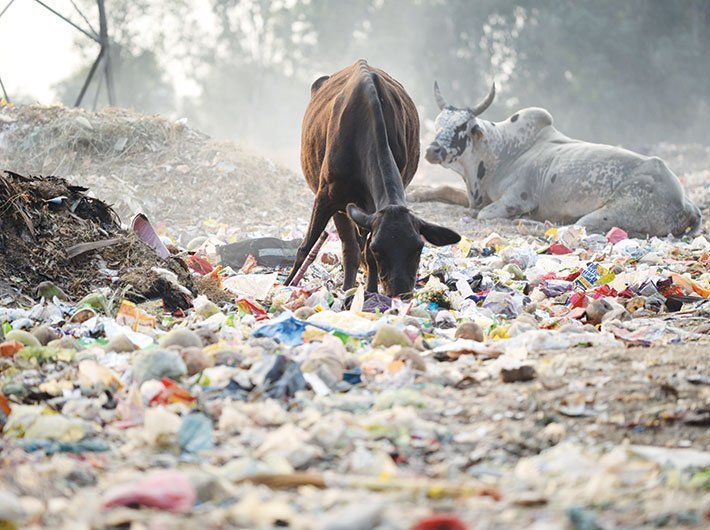Banning cattle trade for slaughter has led to agrarian crisis and will drain country’s economy, says experts
The idea of banning cow slaughter is “terrible and ridiculous”, said professor Vikas Rawal from JNU. A ban would drain the country’s economy as the annual budget to just feed the additional head of cattle would be much more than the entire defence budget of India.
Rawal, from the Centre for Economic Studies and Planning, was addressing a public forum on ‘Agrarian Crisis, Cow Politics & Lynching’ hosted by the Bhumi Adhikar Andolan (BAA) at Delhi’s Constitution Club of India on Friday. The event aimed at highlighting that cattle slaughter is an agrarian issue besides being a communal one.
Professor DN Jha, renowned historian from DU and author of The Myth of The Holy Cow, was the key speaker of the event. He said that the ancestors of Brahmins were beef-eaters and gau-bhakti (cow worship) is nothing but a political agenda that flourished in the late 19th century.
“Do those demanding a nationwide ban on cow slaughter have any idea about its fallout?” questioned Rawal.
He said that if cows would continue to be saved like this, the one-time capital expenditure on cattle sheds would be Rs 10 lakh crore in the next decade. The annual fodder bill for cattle head would be Rs 5.4 lakh crore (more than the defence budget of India).
He added that each animal drinks about 20 litres per day which is almost the water requirement of an entire city in India. “The government is planning to fulfil the fodder requirement of these saved cattle even when the farmers’ land is shrinking with each passing generation.”
Male cattle in India are being thrashed out of the village so that they do not harm the crop or are being poisoned by the farmers as they don’t have option like abandoning them in the limited area. “Slaughtering them is the least painful of all deaths as often they are either starved to death or left to freeze to death," he said.
The Aryans came from outside and were pastoral, making it natural for them to eat beef, said Jha adding that there is “plentiful” evidence in the Vedas that shows that ancient Indians ate beef.
“If you go back in history, there is mention of cattle sacrifice to propitiate deities. The practice continued even after the Vedic period. It existed during the Buddhist period and the time of the Mauryas. The Manu Smriti also mentions it. These fellows [Hindutva proponents] do not realise that the historical evidence is totally against their viewpoint,” said Jha. He gave examples in Vedas of how cows were killed on occasions such as marriage, the sacred thread ceremony, the arrival of the guest, death and house-warmings.
“Gau Mata and Bharat Mata are near contemporaries. The concept of the Bharat Mata came up a little more than a hundred years ago. They will continue to vitiate the cultural and political discourse in India in the coming years,” he added.
Irshad Khan, son of Pehlu Khan, the dairy farmer lynched by cow vigilantes in Rajasthan, was also present at the event. He shared his ordeal and said how he was under pressure by his family to remain quiet.
“We Muslims will not go and live in Pakistan. India is our motherland too,” he said with an impassioned plea for justice to his father.
The 24-year-old man, who was also attacked by the mob of self-styled ‘gau rakshaks’ in Alwar on April 1, alleged that “attempts were being made to let the accused go scot-free”.
“Humare paas gaye thi. Kya Junaid ke paas bhi gaye thi? Usko kyu mara? (We had cows. But did Junaid have one? Why was he killed?)” questioned Irshad.
The notification on banning cattle trade for the purpose of slaughter has impacted the farming community adding to the existing agrarian crisis, said a BAA press release. The central government order has led to widespread alienation among the peasantry especially the small and the poor sections. This is because 50% of the animal wealth belongs to this section and the income from animal husbandry has been 26% of the agrarian GDP and 7.65% of the total GDP.
As per the members of BAA, Madras high court has stayed the order but the impact of the move is already apparent all over the country. Cattle trade and transportation have been badly affected. The price of cattle has come down heavily, distressing the peasant households all over the country. Sectors like tannery and meat processing and, traditional meat retail markets have been affected as they provide employment to lakhs of people that mostly belong to minority sections.

